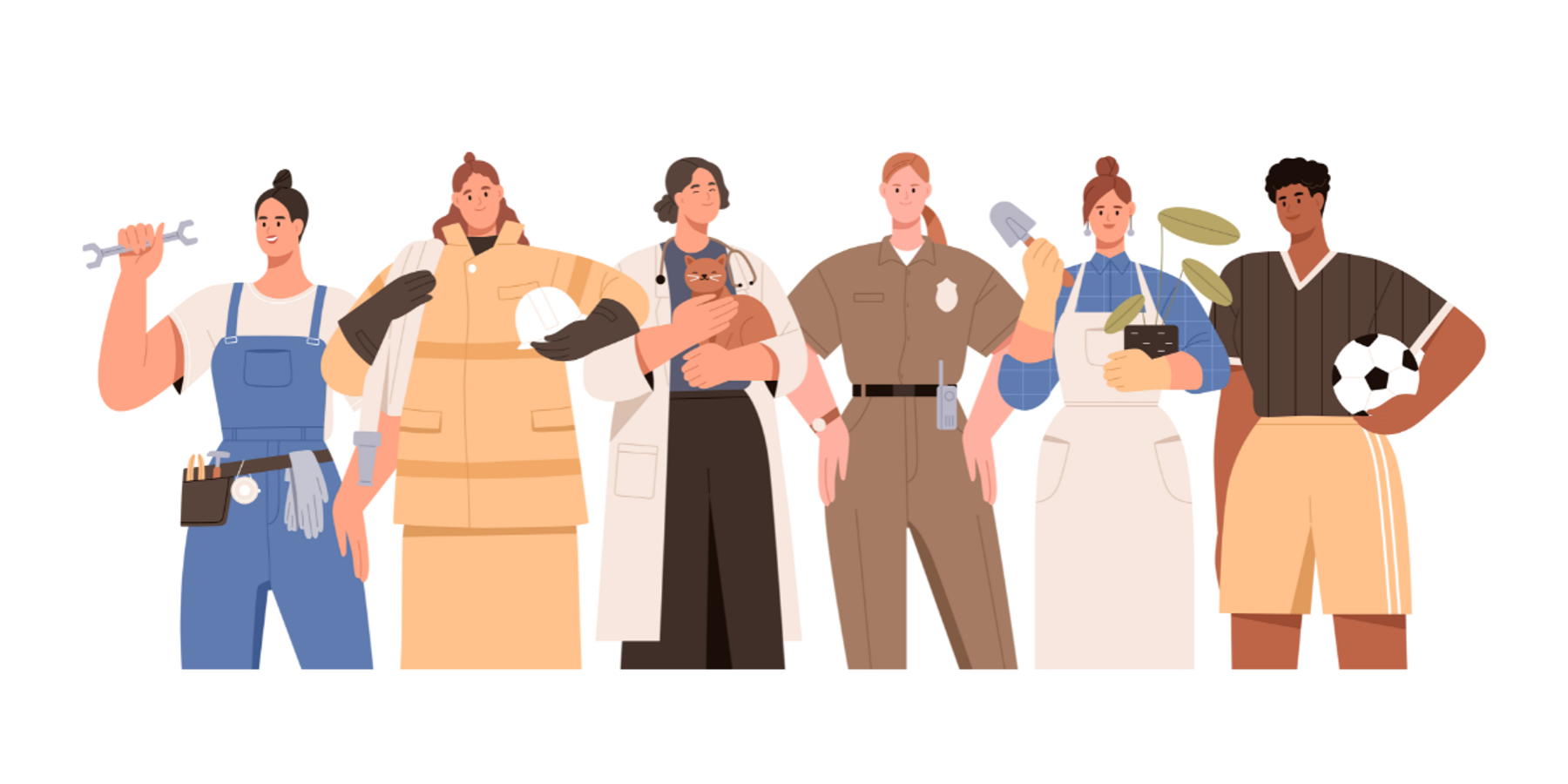We've all been there: you finally landed the ever-important interview and you've provided insightful responses, talked through your experiences, and given useful examples of what you’d do in ‘x’ scenario(s). Now it's time to turn the tables and ask your own questions.
Make no mistake, the questions you ask your interviewer can prove just as crucial as the answers you provide. A well-crafted question not only demonstrates your genuine interest in the role and organization, but it can also effortlessly distinguish you from other candidates.
Asking the appropriate questions at the end of an interview allows you to highlight (among other things!) your critical thinking skills, cultural fit, and long-term vision. The answers to your questions offer insights on what the company values, what challenges you may face, and how you might best contribute.
Let’s look at some effective questions to ask your interviewer that will impress your (future) employer and help you determine whether the organization is a good fit for you.
(Psst... looking for some help to stay organized and monitor your job applications efficiently? We've launched a Career Action Plan Tracker that will keep track of your application progress! Download it below ⬇️)
Download our free Career Action Plan Tracker
Gain visibility, organization, and clarity during your job hunt! This simple-to-use tracker has all the data fields you need, broken down into all the job stages, from pre-interview to various interview rounds, to negotiation to a successful career transition.
10 great questions to ask your interviewer
#1 What does success look like in this role?
This question helps you gauge what is expected and how the business measures performance by recognizing what success looks like in the given role. It (hopefully) clarifies the leadership's priorities, goals, and values. Asking questions like this one indicates that you are already considering how to make a significant contribution and align with the company/team goals.
Example script: “Success means different things in every role and company, and I’ve found it’s helpful to understand what matters most to the team and leadership. From your perspective, what would success look like in this position over the first six months to a year?”
Pro tip: Remember the recruiter or hiring manager's response and include it in your thank you email after the interview to demonstrate your alignment with what they're seeking and reinforce your enthusiasm.
Watch this next: Interview prep: ace your next opportunity
#2 What attracted you to this company?
The nice part of this question is that it doesn’t matter the tenure of the employee interviewing you. Someone may have a completely different answer if they’ve been there for one year or ten, but both answers are equally valuable. You’ll gain insight into the workplace atmosphere, what distinguishes the organization in their industry, and why employees enjoy working there. It also helps you get a handle on the passion that drives the leadership and the company's values, giving you a better view of the company culture.
Example script: “What drew you to this company, and why are you proud to work here? I'm always interested in hearing the perspectives of long-term team members."
Watch this next: How to prep and excel at every stage of the interview process
#3 What are the growth opportunities for this role?
Inquiring about growth potential indicates your commitment and doubles-down on your desire for long-term success at the organization. It’s a clear indication that you’re thinking ahead and intend to continue honing your skills and moving up in the industry and the company. For the answer portion, companies that are able to talk about clear growth routes have higher employee engagement and retention.
Example script: "Can you tell me more about the career growth opportunities available in this position? How do you encourage employees who wish to advance professionally?"
Watch this next: How to exude confidence during an interview
#4 What are some of the challenges the team is facing right now?
It’s important to know both the good and the bad when looking at a new company to work for. Even if the answers aren’t exactly brutally honest, this question gives you at least a sample of the challenges that the organization is attempting to tackle while also providing a realistic image of the role. It also allows you to demonstrate how your skills and experience may be useful in solving these problems. Additionally, it’s a great time to showcase your proactive approach in trying to help overcome obstacles or even explain a time when you faced similar challenges in a different role.
Example script: "What are some of the team's current challenges, and how would someone in this job assist address them? I'm curious about how my expertise can have an instant impact."
Pro tip: In your thank-you email, identify particular skills or experiences that can assist with those challenges, emphasizing that you are willing to step in and assist with problems.
Read this next: How to answer leadership skills interview questions
#5 How does the company support work-life balance?
Querying about work-life balance reflects your desire to create a healthy work environment. Regardless of what your preferred work-style might be, it’s important to grasp the company's policies regarding flexibility, remote work, and wellness support systems. This question assists you in determining whether the company's values are consistent with your personal values (no matter what those are) regarding balancing work and life.
Example script: "How does the company promote work-life balance for its employees? Are there any flexible work arrangements or policies in place to encourage a good balance?"
Read this next: Master how to sell yourself in an interview
#6 How would you describe the culture here?
Needless to say, this is the question that helps you understand the company's culture, values, and how employees interact with one another. A company's culture plays an important role in determining whether you'll succeed there and enjoy coming to work. Having even just a cursory idea of what that looks like before accepting an offer will allow you to make an informed decision. (Editor’s note: I like to ask about how the team communicates to supplement this question!)
Example script: "Could you explain the company culture here? How would you describe how it’s different from your competitors?”
Read this next: 5 reasons to turn down a job offer
#7 What does a typical day look like in this role?
Particularly considering how job titles can vary greatly even in the same industry, you’ll want to know more about the day-to-day expectations. To ensure that the position fits your interests and skill set, it is essential to comprehend the everyday responsibilities and expectations of the position. This question gets you ready for the practical aspects of the job and has the added bonus of helping you picture yourself in the role.
Example script: “How would a normal day in this position go? Could you describe a normal workday or list of duties for someone in this role for me?”
Pro tip: Take it a step further and demonstrate how you can fit into the position by connecting the hiring manager's response to your own background and future accomplishments.
Watch this next: Tips to excel in your next interview
#8 How do you measure performance for this role?
To make sure you’re able to meet the company's expectations, it's important to find out how your performance will be assessed. Additionally, it enables you to have a good idea of how to fulfill the key performance indicators (KPIs) right away and prepare accordingly. Sometimes even just knowing that a team tracks performance rigorously or in a data-driven way can give you a good idea of the company and team culture, too!
Example script: "What important metrics or objectives would I be expected to meet during the first six months of this role, and how do you measure performance?"
Read this next: 6 tips for acing any job interview
#9 How often do you provide feedback and performance reviews?
An easy way to show your dedication to continuous growth is to ask about feedback and frequency of reviews. And don’t forget, feedback often goes both ways! How often are you expected to provide your manager feedback, for example? Are reviews two-way conversations? Do performance reviews impact bonuses and merit raises? In order to know when to anticipate constructive criticism or praise, it also helps you understand how often performance evaluations are conducted.
Example script: "How frequently do you give employees performance reviews and feedback in this role? Regular feedback, in my opinion, is important for both professional and personal development.”
Watch this next: Tips on navigating the recruitment process
#10 What has been your favorite part about working for this company?
You can learn more about what current employees like most about the organization by asking this question. It provides insights into the company's strengths and how employees feel about their jobs/roles/teams. It can also assist you in determining whether the business genuinely values its workers. If you’re feeling up for it, you can also ask about what their least favorite part is.
Example script: “Personally, what has been your favorite aspect of your job at this company? What do you think are the best features of the workplace culture and atmosphere?”
Pro tip: Keep an eye out for recurring themes; if everyone emphasizes growth opportunities, mentorship, or teamwork, it's a clear indication of a good environment!
Read this next: 4 ways to nail the follow-up email after an interview
Wow them with your curiosity
Asking the right questions at the end of an interview is a powerful way to leave a lasting impression on your potential employer. In addition to showcasing your readiness, the questions you ask at the end of an interview also give you important information about the business and its expectations. Asking the right questions can help you make an informed choice, whether your goal is to comprehend the role's challenges, growth prospects, or business culture.
These questions not only demonstrate your preparedness for the position, but they also give you some great information that will help you determine whether the organization shares your values and career goals. Making sure you have all the information you need to make an informed decision is just as important to a successful interview as impressing the interviewer! Make sure you leave the discussion with clarity and confidence and use these questions the next time you're getting ready for an interview.




